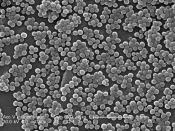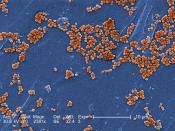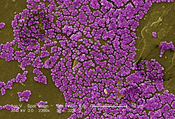In the last several years, there has been a renewed interest in MRSA (methicillin-resistant Staphylococcus aureus) skin infections not only in the United States, but world-wide. MRSA has existed since the 1960s, but the frequent use and abuse of antibiotics has caused the infection to become more and more difficult to treat. Although "studies approximate that 30-50% of the population carry colonies of Staphylococcus aureus on their bodies all of the time", the elderly, children and those who have compromised immune systems are more susceptible to becoming infected. (MRSAresources.com)Colonization of MRSA can normally exist in the nose and on the skin, but there are no signs of illness until infected. Conversely, when infected, there are signs and symptoms such as redness, that can look like a spider bite, a pimple or a boil and/or swelling with and without pain, which can have pus and could produce fever in severe cases.
In addition to other types of infections, the major concern about MRSA is the increased possibility an infection can penetrate the immune system through the skin and cause septicemia, an infection of the blood, which is life-threatening.
There are two types of MRSA infections: Healthcare-associated MRSA (HA-MRSA) and community-associated MRSA (CA-MRSA) and both types affect the public in general. HA-MRSA, in the past 40 years, has been found in small and large hospitals and long-term healthcare facilities. The "risk factors associated with HA-MRSA include: prolonged hospitalization or resident of a nursing home, patients undergoing dialysis, indwelling catheters, ICU exposure, prior antimicrobial therapy, surgical procedures, and close proximity to a patient in the hospital colonized with MRSA". (Chavez & Decker, 2008) HA-MRSA can be linked to urinary tract, pneumonia, and surgical wound, septicemia, skin and soft tissue infections.
"When we talk about the spread of an infection, we...


